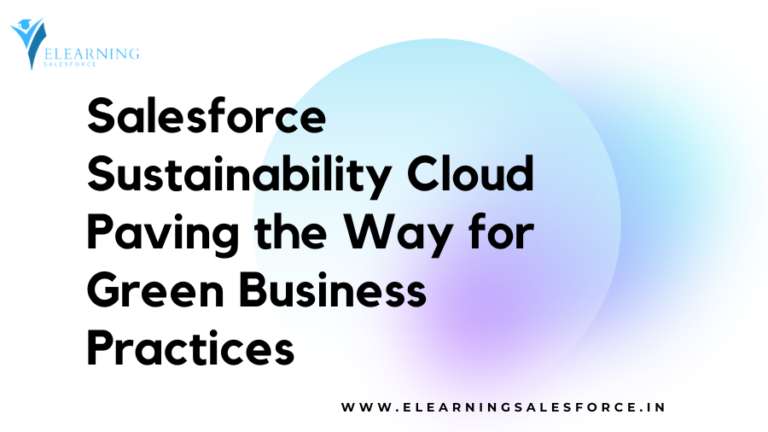Salesforce is a powerhouse in the world of customer relationship management (CRM) and cloud computing. Its suite of cloud-based services, known as “Salesforce Clouds,” offers businesses a wide range of tools and solutions to streamline their operations, enhance customer engagement, and drive growth. In this blog, we’ll delve into the various Salesforce Clouds and explore their unique features and capabilities.
- Sales Cloud
Sales Cloud is Salesforce’s flagship offering, designed to help businesses manage their sales processes more effectively. It provides tools for lead management, opportunity tracking, email integration, and sales analytics. Key features include:
- Contact and Lead Management: Easily capture and organize customer information.
- Opportunity Management: Track sales opportunities through the entire sales cycle.
- Email Integration: Sync emails, calendars, and tasks with Salesforce for seamless communication.
- Sales Analytics: Gain insights into sales performance with customizable dashboards and reports.
- Sales Automation: Automate repetitive tasks to improve efficiency and focus on selling.
- Service Cloud
Service Cloud is tailored for customer support and service teams, enabling them to deliver exceptional customer experiences. Its features include:
- Case Management: Efficiently resolve customer issues with case tracking and automation.
- Knowledge Base: Create and maintain a searchable database of articles and solutions.
- Omni-Channel Support: Manage customer inquiries from various channels like email, chat, and social media.
- Service Analytics: Monitor service performance and customer satisfaction.
- Field Service: Dispatch and manage field service agents for on-site support.
- Marketing Cloud
Marketing Cloud empowers businesses to create personalized marketing campaigns and engage with customers across multiple channels. Its features include:
- Email Marketing: Design and send targeted email campaigns.
- Social Media Marketing: Schedule and analyze social media posts.
- Customer Journeys: Create customized customer journeys with automation.
- Analytics and Reporting: Measure campaign effectiveness and ROI.
- Advertising Studio: Manage online advertising campaigns from within Salesforce.
- Commerce Cloud
Commerce Cloud is designed for e-commerce businesses, providing a platform to create seamless online shopping experiences. Key features include:
- Unified Commerce: Manage both online and in-store sales from a single platform.
- Personalization: Deliver tailored product recommendations and experiences.
- Order Management: Streamline order processing and fulfillment.
- AI-Powered Insights: Leverage AI for data-driven merchandising and pricing.
- Mobile Optimization: Create mobile-responsive shopping experiences.
- Community Cloud
Community Cloud enables businesses to build branded online communities for customers, partners, and employees. Features include:
- Customizable Communities: Create branded and personalized community spaces.
- Collaboration: Foster collaboration and knowledge sharing.
- Customer Self-Service: Empower customers to find answers and solutions on their own.
- Partner Portals: Share resources and information with partners securely.
- Lightning Bolts: Accelerate community development with pre-built templates.
- Analytics Cloud (Tableau CRM)
Formerly known as Einstein Analytics, Analytics Cloud is a robust business intelligence and analytics platform. Key features include:
- Data Visualization: Create interactive dashboards and reports.
- Predictive Analytics: Utilize AI-powered insights for data-driven decision-making.
- Integration: Connect data from various sources for a holistic view.
- Natural Language Processing: Ask questions in plain language to get insights.
- Mobile Analytics: Access analytics on the go through mobile apps.
- IoT Cloud
IoT Cloud allows businesses to harness the power of the Internet of Things (IoT) to gain insights and automate actions based on IoT data. Features include:
- Data Ingestion: Collect and process data from IoT devices.
- Rules Engine: Define rules to trigger actions based on IoT data.
- Real-time Analytics: Monitor and analyze IoT data in real-time.
- Integration: Seamlessly integrate IoT data with other Salesforce Clouds.
Salesforce Clouds offer a comprehensive suite of solutions to meet the diverse needs of businesses across various industries. Whether you’re focused on sales, customer service, marketing, e-commerce, community building, analytics, or IoT, there’s a Salesforce Cloud tailored to help you achieve your objectives. By exploring and leveraging the features of these clouds, organizations can transform their operations, enhance customer experiences, and drive growth in an increasingly digital world.




